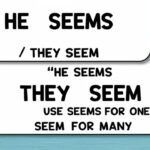Learning the word Giving is simple. It shows an action happening now. When someone says, “She is giving a toy,” it means the action is in progress. It helps you understand what is going on at that moment.
The word Given works differently. It shows something already finished. For example, “He has given his book” means the action is complete. It can also describe conditions, like “Under the given rules, we play safely.”
Both words come from the verb “give.” Knowing when to use giving or given makes your English stronger. It makes your speech clear and correct. With practice, you will learn the right form without feeling confused.
Understanding “Giving” and “Given” – The Basics
The word Giving shows an action happening right now or continuing for some time. For example, “She is giving her friend a pencil.” It helps describe something that is not finished yet and is still taking place in the present moment.
The word Given has another meaning. It can show something already completed, like “He has given his homework.” It can also describe special conditions, such as “Under the given rules, we play.” This makes sentences clear and correct.
| Word | Function | Example |
| Giving | Present participle/gerund | She is giving a speech. |
| Given | Past participle | He has given his answer. |
| Given | Adjective | Under the given conditions… |
| Given | Preposition | Given the circumstances, I agree. |
Using “Giving” in Continuous Tenses
“Giving” thrives in continuous tenses because it expresses ongoing or repeated actions.
Present Continuous: Action Happening Now
The Present Continuous tense tells about something taking place right now. For example, “She is giving a gift.” It shows the action is not finished. This tense helps explain events that are happening at this very moment.
Using Present Continuous makes sentences clear and easy. For instance, “He is eating lunch” or “They are running fast.” It always uses “is,” “am,” or “are” with the verb. This way, the listener understands the action is happening now.
See also : Cartel vs Mafia: Key Differences in Organized Crime
Past Continuous: Actions Happening in the Past
The Past Continuous tense shows an action that was going on at a time before now. For example, “She was giving a story when I entered.” It explains something that continued for a while in the past.
Using Past Continuous helps describe past moments more clearly. For example, “He was reading a book yesterday evening.” This tense uses “was” or “were” with the verb. It tells that the action started earlier and continued during that past time.
Present Perfect Continuous: Action Started in the Past and Still Ongoin
The Present Perfect Continuous tense shows an action that began earlier and is still happening now. For example, “She has been giving lessons for two hours.” It joins the past with the present and tells that the action continues.
This tense uses “has been” or “have been” with the verb. For instance, “They have been playing since morning.” It makes the time and action clear. The Present Perfect Continuous tense helps show how long something has been going on.
Common Mistakes with “Giving” in Continuous Tenses
- Using given instead of giving in ongoing actions. Example: “She is given a speech” (wrong). Correct: “She is giving a speech.”
- Choosing giving when a simple past tense is needed. Example: “She was giving the report yesterday” (wrong). Correct: “She gave the report yesterday.”
- Forgetting to use “is,” “am,” or “are” with giving in present continuous sentences. Example: “He giving advice” (wrong). Correct: “He is giving advice.”
The Many Faces of “Given”

“Given” is a versatile word that wears multiple grammatical hats, making it trickier than “giving.”
“Given” as a Past Participle in Perfect Tenses
| Tense | Example | Explanation |
| Present Perfect | He has given his word. | Action completed at some point before now. |
| Past Perfect | She had given all she could. | Action completed before another past event. |
| Future Perfect | By tomorrow, they will have given notice. | Action that will be completed in the future. |
“Given” in Passive Voice
The word Given is often used to show that something was received or handed over. For example, “The prize was given to the winner.” It places focus on the result instead of the person who did the action.
Using Given in sentences makes meaning clear when the doer is not important. For instance, “The homework was given yesterday.” This form helps learners understand that the main idea is about what happened, not always about who made it happen.
| Active Voice | Passive Voice |
| She gave him the book. | The book was given to him. |
| They have given us instructions. | Instructions have been given to us. |
“Given” as an Adjective
The word Given can work like an adjective. It describes something that is already decided or fixed. For example, “At a given time, the bell will ring.” It shows something special, clear, or already known.
Using Given in this way makes sentences simple to understand. For instance, “Under the given rules, we must sit quietly.” It tells about conditions or facts that cannot change. This use is common in stories, lessons, and rules.
- Given describes something fixed or decided. Example: “At a given time, the class will start.”
- It shows conditions already set. Example: “Under the given rules, we must stay quiet.”
- It means particular or specific. Example: “A given fact cannot be changed.”
See also : Substantive vs Substantial – Key Differences Explained
“Given” as a Preposition
The word Given can also act like a preposition. It means “considering” or “because of.” For example, “Given the weather, the match was canceled.” It helps explain the reason or condition that affects what is happening.
Using Given in this way makes sentences clear and strong. For instance, “Given his age, he runs very fast.” It sets the background for the action. This use is common in daily talk, stories, and even classroom lessons.
- Given means “considering” or “because of.” Example: “Given the rain, we stayed inside.”
- It introduces a reason or condition. Example: “Given his kindness, everyone liked him.”
- It sets background for understanding. Example: “Given her talent, success was expected.”
Side-by-Side Examples: “Giving” vs “Given” in Context
| Sentence with “Giving” | Sentence with “Given” | Explanation |
| I am giving a gift to my friend. | The gift was given to my friend. | “Giving” is an ongoing action; “given” is a past participle in passive. |
| She was giving advice when I arrived. | Advice was given to me yesterday. | Past continuous vs. passive past. |
| They have been giving donations regularly. | Donations have been given every year. | Present perfect continuous vs. present perfect passive. |
| Given the circumstances, we must act fast. | He has given his approval. | Prepositional “given” vs. past participle. |
Practical Tips for Choosing Between “Giving” and “Given”
- Use giving when the action is happening now or continuing. Example: “She is giving advice.”
- Choose given for completed actions or passive forms. Example: “The prize was given yesterday.”
- Apply given as an adjective or preposition when showing conditions. Example: “Given the rules, we must listen.”
Quick Mnemonic for Remembering
- Giving = Going → Think of giving as an action still going on.
- Given = Done → Remember given shows something already finished or decided.
- Giving = Now, Given = Completed → One continues in the present, the other points to what’s complete.
Common Errors and How to Avoid Them

- Mixing given with continuous tenses. Wrong: “She is given a talk.” Correct: “She is giving a talk.”
- Forgetting adjective use of given. Wrong: “The rule is hard.” Correct: “The given rule is hard.”
- Using active instead of passive with given. Wrong: “She given the book.” Correct: “The book was given to her.”
Final Thoughts
Learning how to use Giving and Given makes writing and speaking easier. One shows an action in progress, while the other explains something complete or describes conditions. Understanding the difference helps you build strong sentences that sound correct every time.
With practice, the use of Giving and Given becomes natural. Reading examples and making your own sentences will improve confidence. Step by step, you will see how these words guide meaning and make your English clear and simple.
FAQs
How Do You Use Given in a Sentence?
Given shows something provided or accepted. Example: “She was given a prize.” It also introduces conditions like “Given the weather, we stayed home.”
How to Use the Word “Giving”?
Giving describes offering or providing. Example: “He is giving help to his friend.” It also shows kindness, generosity, or continuous action.
Which Is Correct, Gave or Give?
Give is the present tense form. Gave is the past tense form. Example: “I give daily” versus “I gave yesterday.”
What’s the Difference Between Gifted and Given?
Gifted often means a talent or something offered as a present. Given means something handed over, granted, or provided in different contexts.

Join Bibcia on a journey to master English grammar. Discover easy lessons, writing tips, and practical examples designed to make learning grammar simple and effective.










